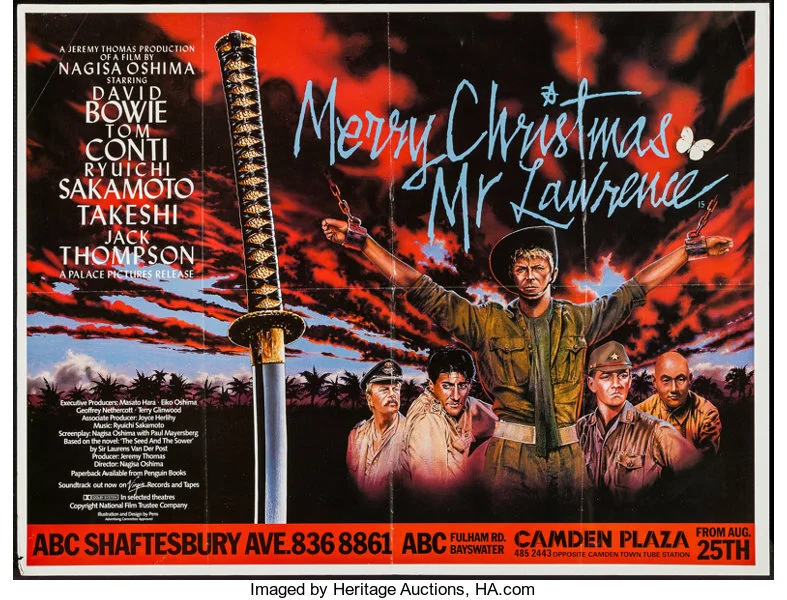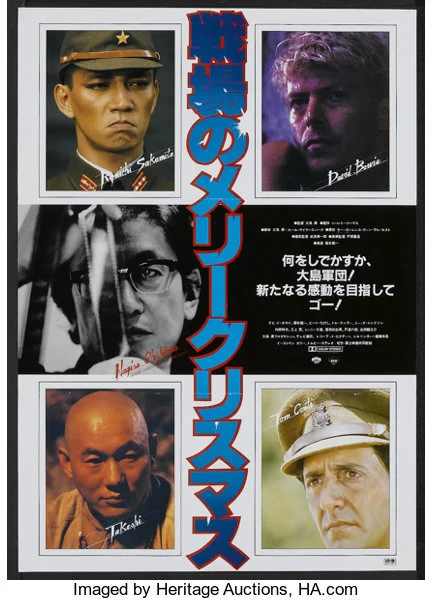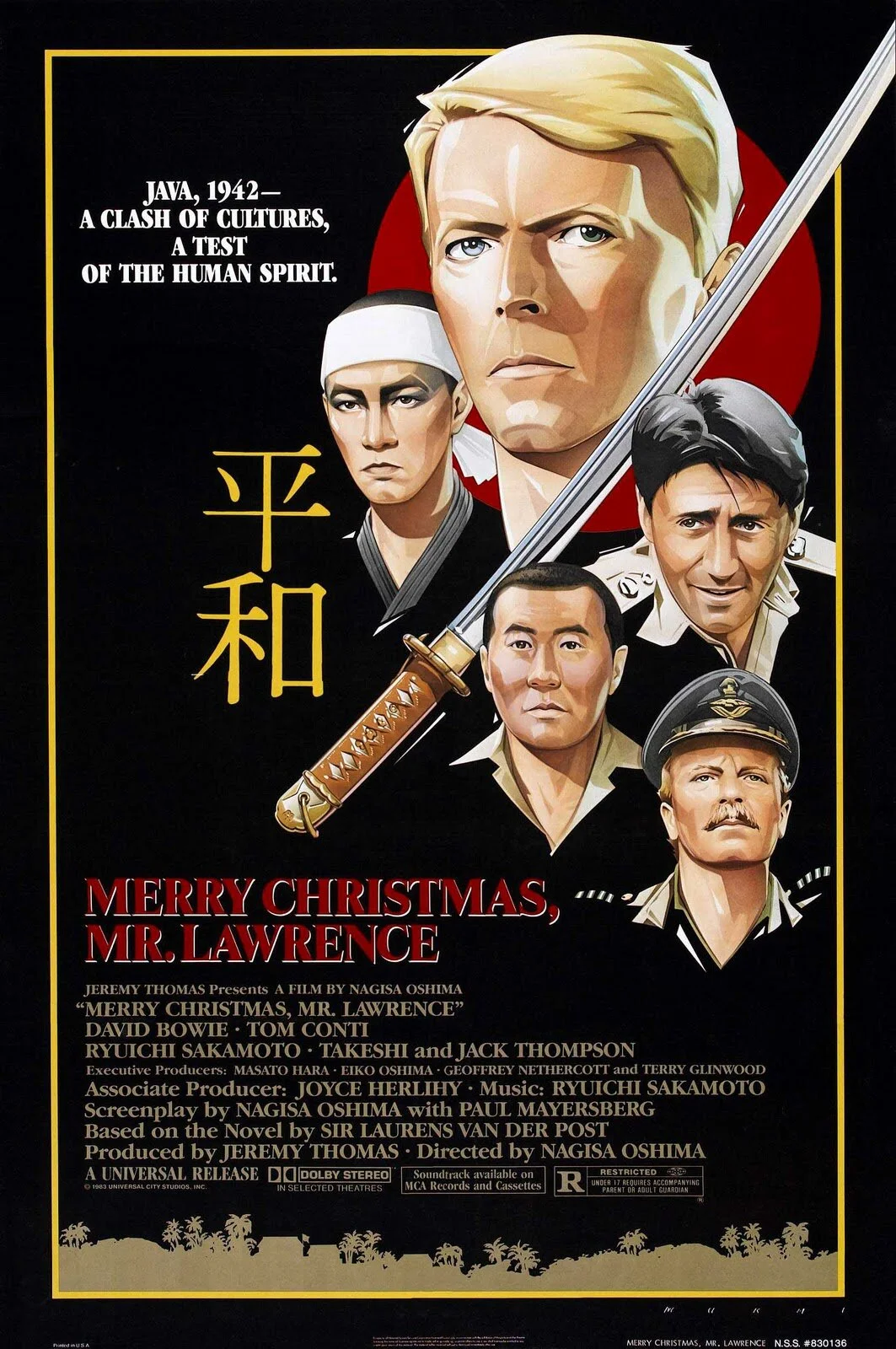Control Nathan Rabin #204 Merry Christmas, Mr. Lawrence (1983)
Welcome, friends, to the latest entry in Control Nathan Rabin 4.0. It’s the career and site-sustaining column that gives YOU, the kindly, Christ-like, unbelievably sexy Nathan Rabin’s Happy Place patron, an opportunity to choose a movie that I must watch, and then write about, in exchange for a one-time, one hundred dollar pledge to the site’s Patreon account. The price goes down to seventy-five dollars for all subsequent choices.
Or you can be like three kind patrons and use this column to commission a series of pieces about a filmmaker or actor. I’m deep into a project on the films of the late, great, fervently mourned David Bowie and I have now watched and written about every movie Sam Peckinpah made over the course of his tumultuous, wildly melodramatic psychodrama of a life and career.
This generous patron is now paying for me to watch and write about the cult animated show Batman Beyond and I also recently began even more screamingly essential deep dives into the complete filmographies of troubled video vixen Tawny Kitaen and troubled former Noxzema pitch-woman Rebecca Gayheart. I also recently began a series chronicling the films of bad boy auteur Oliver Stone.
I have been putting off writing about some of David Bowie’s biggest roles and biggest movies for this column because his biggest performances are often also in big old bummers.
That’s certainly true of Bowie’s role as Pontius Pilate in Martin Scorsese’s incendiary, controversial and also depressing as fuck exploration of guilt, sin, sacrifice and salvation, The Last Temptation of Christ.
It’s equally true of Bowie’s small but notable role in Twin Peaks: Fire Walk With Me, which is grim even by David Lynch standards. But perhaps nothing in Bowie’s checkered but sometimes marvelous filmography is quite as bleak as Merry Christmas, Mr. Lawrence, Nagisa Ōshima’s 1983 adaptation of Sir Laurens Jan van der Post’s semi-autobiographical novel The Seed and the Sower.
As a powerful psychodrama about the intensely homoerotic lives of British prisoners and Japanese soldiers in a Japanese POW Camp in 1942 Java Merry Christmas, Mr. Lawrence combines the soul-crushing grimness of a movie about the insanity of war with the unrelenting harshness of a prison movie and the unsparing, clear-eyed intensity of arthouse cinema at its most uncompromisingly brutal.
J.C in a Jesus pose
I put off watching Merry Christmas, Mr. Lawrence because it’s the kind of movie that’s damn near impossible to enjoy no matter how good it might be. That’s because the explicit point of movies like Merry Christmas, Mr. Lawrence is not enjoyment or entertainment but rather to communicate something true and profound and powerful about the nature of war and how it reflects the beauty and fragility as well as the horror of existence.
In an extraordinary performance that makes skillful use of Bowie’s background as a mime, the rock and roll icon plays Maj. Jack "Strafer" Celliers, an Allied soldier who is defiant in the face of a fate worse than death when he’s sentenced to a POW camp.
In a mesmerizing turn, Bowie effortlessly conveys a tricky, complicated combination of strength, resilience, tenderness, vulnerability, sexuality and madness. What’s the point of trying to remain sane in a world gone mad?
When Bowie’s Christ-like Major (they even have the same initials) is in Japanese custody he tries to stay sane and hold onto his fading connection to the world he left behind by shaving himself with an invisible razor, lovingly pantomiming what was once a banal daily ritual.
He’s doing everything that he can to stay sane even if it looks from the outside like madness. It’s a powerhouse sequence that highlights Bowie’s talent as an actor. Bowie wasn’t just a rock star who made some movies, like some of his contemporaries.
Bowie wasn’t just a guy with a big, appealing personality that lent itself to movie stardom. No, Bowie was a bona fide thespian, an actor of tremendous depth and power who could be absolutely mesmerizing and heartbreaking in the right role and Merry Christmas, Mr. Lawrence gives Bowie easily one of the juiciest, meatiest and most challenging roles of his extraordinary career.
In Merry Christmas, Mr. Lawrence Bowie embodies the resilience of the human spirit in a way that never feels mawkish or sentimental. He’s a pillar of strength but also a deeply sad, even tragic figure haunted ineffably by the sins and mistakes of the past.
When he is to be killed by a firing squad, Bowie’s soldier’s soldier refuses a blindfold, preferring to look the men who will kill him in the eyes. Through magic or fate or incompetence, the half-mad soldier survives the firing squad and ends up in a camp where his androgynous beauty and strength of character make him at once an object of taboo sexual desire and anger.
Tom Conti costars as the title character, an English officer with the stiffest of upper lips who acts as an intermediary between Japanese captors and British captives because he is the only Allied soldier who can speak Japanese.
Perhaps unsurprisingly, Conti did not speak Japanese when he was cast but he’s so convincing as someone with a special emotional connection to his captors rooted in speaking the same language that it never seems like he’s speaking Japanese phonetically, even though he is.
Mr. Lawrence is a conflicted man caught between worlds, between the Japanese soldiers who control his fate and the grim lives of his fellow captives, who are so gaunt and undernourished that it seemingly takes all of their strength and willpower just to keep from tumbling to the ground in a heap of exhaustion, hunger and despair.
Conti is so quintessentially British in his stoic determination to make the best of an unbearably bad situation that when he finally loses his cool and explodes with pent-up anger and rage after being told that he will be executed for a crime he did not commit, it’s all the more powerful for being so out of character.
In this revelatory moment all of the walls and defenses that he has built up for the sake of survival against impossible odds come crashing down and the hopelessness he’s been suppressing all film long comes rushing to the surface.
Merry Christmas, Mr. Lawrence reminded me a lot of one of my favorite movies from this era, Paul Shrader’s Mishima: A Life in Four Chapters in its combination of striking formal beauty and dazzling darkness.
The film also resembles Mishima in its exploration of the complicated intersection of Japanese concepts of order and propriety and furtive, forbidden homosexual desire. Finally Merry Christmas, Mr. Lawrence reminded me of my all-time favorite Paul Schrader directorial effort in having a hypnotic score an era and world removed from the film’s milieu.
Only instead of Philip Glass’ relentless minimalism, Merry Christmas, Mr. Lawrence gets much of its dreamy, otherworldly tone from co-star Ryuichi Sakamoto’s acclaimed synthesizer score.
Ōshima apparently did not speak English and his English cast did not speak Japanese so according to Bowie, he gave the Japanese cast extensive direction and then told the English actors to do whatever it was that they did to the best of their abilities.
That sounds like a recipe for disaster but it also mirrors the dynamic of the characters in the film, since, with the exception of Conti’s frazzled peace-keeper/diplomat, they don’t speak each other’s language either.
Merry Christmas, Mr. Lawrence was every bit as soul-crushing as I had anticipated. Thankfully, Bowie’s heartbreaking performance alone makes it worth watching, and it has a whole lot more to offer than one of our greatest icons in one of his greatest roles.
Pre-order The Weird A-Coloring to Al/Colored-In version here: https://www.kickstarter.com/projects/weirdaccordiontoal/the-weird-a-coloring-to-al-coloring-colored-in-books
Pre-order The Joy of Trash: Nathan Rabin’s Happy Place’s Definitive Guide to the Very Worst of Everything and get access to original articles AS I write them and plenty more bonus stuff like exclusive cards featuring Felipe Sobreiro’s amazing artwork for the book at https://the-joy-of-trash.backerkit.com/hosted_preorders/cart
Help ensure a future for the Happy Place during an uncertain era AND get sweet merch by pledging to the site’s Patreon account at https://www.patreon.com/nathanrabinshappyplace








